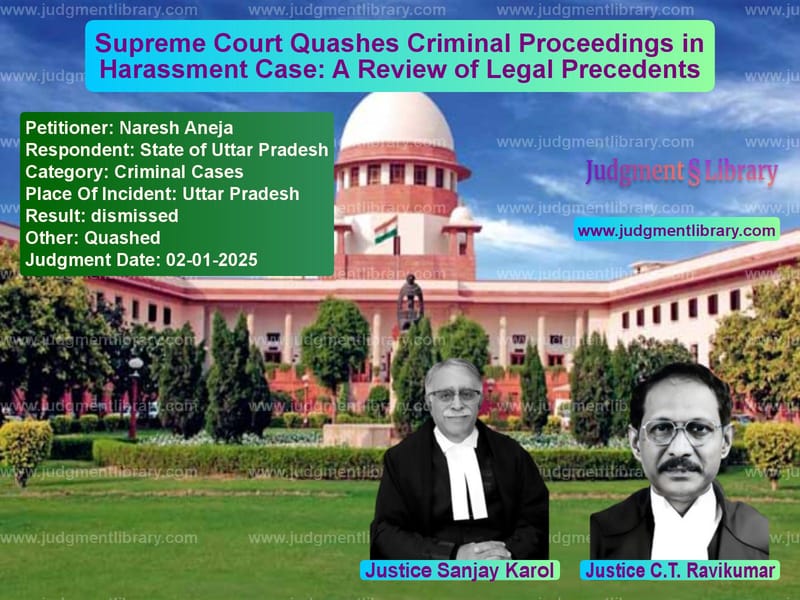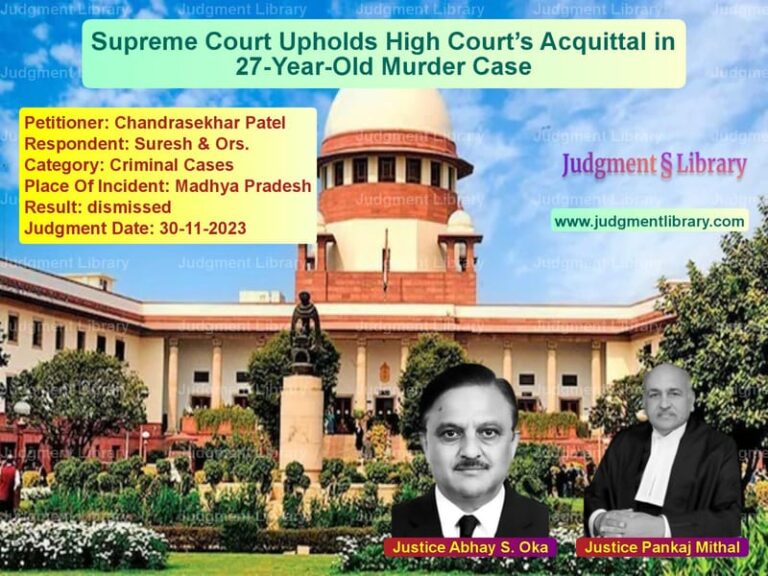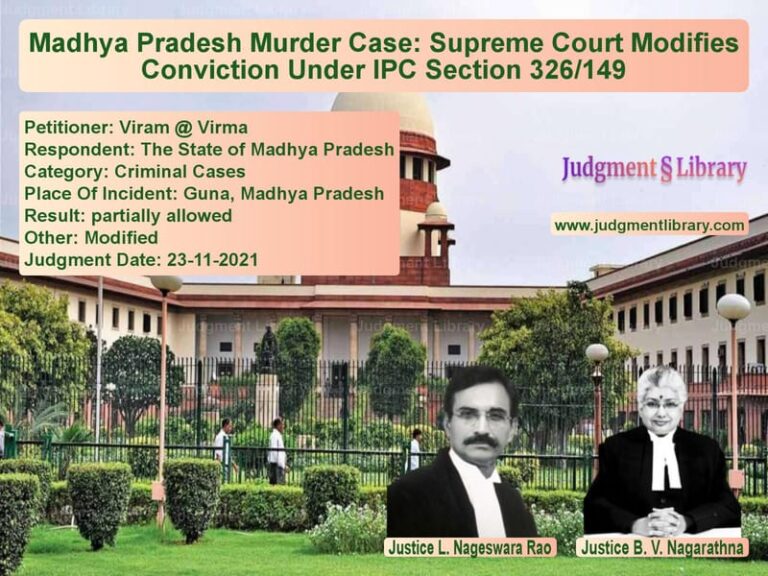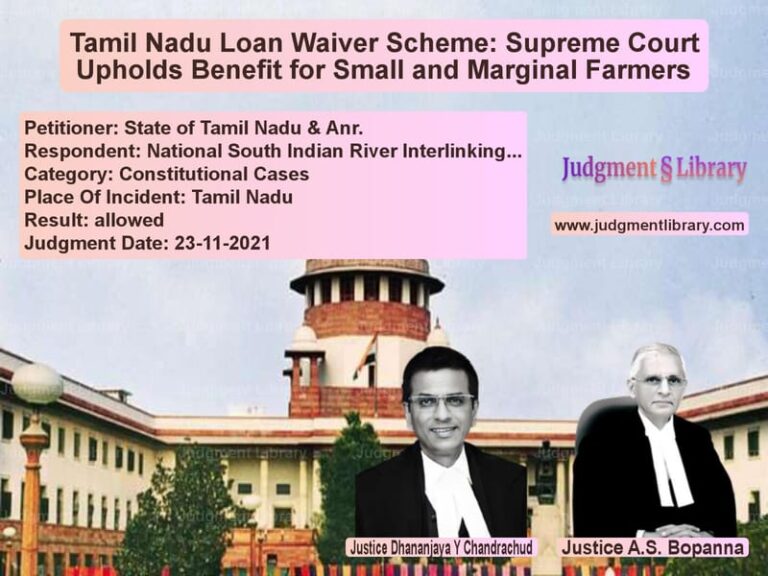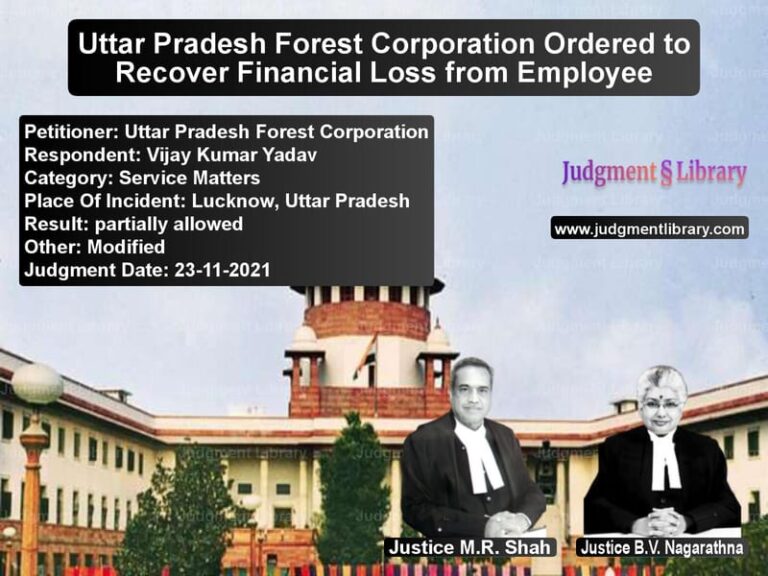Supreme Court Quashes Criminal Proceedings in Harassment Case: A Review of Legal Precedents
The Supreme Court of India recently delivered a significant judgment in the case of Naresh Aneja @ Naresh Kumar Aneja v. State of Uttar Pradesh & Anr., which has far-reaching implications on criminal proceedings, harassment allegations, and the power of High Courts to quash cases under Section 482 of the Criminal Procedure Code (CrPC). The case revolved around charges of sexual harassment under Section 354 of the Indian Penal Code (IPC) and criminal intimidation under Section 506 IPC. The appellant, Naresh Aneja, had sought to quash the charges leveled against him by the complainant, Pooja Tankha, who had accused him of inappropriate behavior and threatening her during their professional relationship.
This case highlights the complex intersection between criminal law, business disputes, and the misuse of legal proceedings. The Supreme Court’s intervention was necessary due to the conflicting claims between the parties involved and the procedural shortcomings observed in the lower courts. The Court’s judgment ultimately quashed the criminal proceedings against Naresh Aneja, setting a precedent for similar cases involving false accusations or insufficient evidence in sexual harassment claims.
Background of the Case
The appellant, Naresh Aneja, was one of the directors of a company, “M/s LAJ-IDS Exports Pvt. Ltd.,” in which the complainant, Pooja Tankha, was also a director. The two had worked together from 2018, with disputes regarding company finances and business dealings arising over time. Pooja Tankha alleged that in 2018, while working at the office, Naresh Aneja had inappropriately touched her and subjected her to physical harassment. She claimed that the harassment occurred over a period and was witnessed by other colleagues. Following these incidents, she filed a complaint with the police, but the authorities took no action at first, which led her to approach the Senior Superintendent of Police, Gautambuddh Nagar.
The charges against Naresh Aneja included accusations of harassment and threats of bodily harm (under Section 354 and Section 506 IPC), leading to the registration of an FIR on August 14, 2019. After investigations, the chargesheet was filed on January 10, 2020. Despite these developments, Naresh Aneja, along with his brother R.K. Aneja, filed an application in the High Court seeking the quashing of the FIR, alleging that the case was a result of business rivalry and personal animosity.
Key Legal Issues
- Whether the allegations of sexual harassment under Section 354 and criminal intimidation under Section 506 IPC against Naresh Aneja were prima facie made out based on the available evidence.
- Whether the High Court’s decision to refuse quashing the criminal proceedings under Section 482 CrPC was justified or if the charges were groundless.
- The role of a High Court in quashing proceedings based on the assessment of prima facie evidence in criminal cases.
- Whether the appellant could claim that the criminal proceedings were initiated out of malice or to cause harm, without clear evidence of harassment or intimidation.
Arguments of the Parties
Petitioner’s Arguments
The appellant, represented by Senior Counsel, raised the following points:
- The complainant had ulterior motives and was using the legal system to harm his reputation and the business relationship.
- The alleged incident was not of a sexual nature, and there was no physical evidence of the accused’s misconduct, such as photographs, medical reports, or any corroborating witness statements.
- The business rivalry and disputes over financial mismanagement were the true cause behind the accusations, and the complainant’s allegations were fabricated.
- The investigation report and the chargesheet failed to provide sufficient evidence that would substantiate the claims made by the complainant.
Respondents’ Arguments
The respondents, represented by the complainant’s counsel, argued the following:
- The complainant’s allegations were consistent and supported by her statements recorded under Section 161 and 164 CrPC, which corroborated the allegations of harassment and intimidation.
- Witnesses who were present at the workplace, such as Chaman Lal and Ashish Pawan, had confirmed seeing the inappropriate behavior, which validated the complainant’s claims.
- The fact that the complainant filed the complaint after several months does not undermine the validity of the allegations, as the actions of the accused were intended to create fear and intimidate her.
- The appellant had attempted to settle the matter through legal and financial coercion, indicating that his actions were deliberate and intended to cause harm to the complainant’s professional standing.
Supreme Court’s Observations
The Supreme Court, after reviewing the case and examining the submissions from both sides, made the following observations:
“In matters of serious allegations such as sexual harassment and criminal intimidation, it is essential that the complaint be considered with all due seriousness, and at the same time, the accused must not be subject to proceedings that are initiated out of malice or lack of substance. The Court must assess whether prima facie evidence exists to support the claims made by the complainant.”
The Court noted that while the allegations were serious, the evidence presented, including witness statements and the complaint, lacked the substantive corroboration needed to support a charge under Section 354 IPC. The Court also emphasized that statements made under Section 161 CrPC are inadmissible unless corroborated by other credible evidence. The lack of sufficient evidence to substantiate the harassment claim led to the Court’s decision to quash the proceedings.
Final Judgment and Directions
The Supreme Court, in its judgment, ruled as follows:
- The criminal proceedings against Naresh Aneja were quashed, as no prima facie case was made out under Section 354 and Section 506 IPC based on the evidence presented.
- The High Court’s refusal to quash the charges was found to be erroneous, as it did not appropriately consider the lack of substantial evidence against the appellant.
- The Court made it clear that while complaints of sexual harassment should be taken seriously, the legal process should not be abused or used to harm individuals based on personal grudges or business disputes.
- The charges were quashed in the interest of justice, with the case dismissed against Naresh Aneja.
Implications of the Judgment
This judgment serves as an important reminder that accusations in criminal cases, especially those related to sexual harassment, must be supported by credible and sufficient evidence before proceeding with trial. The Court’s decision to quash the charges highlights the need for a thorough investigation and careful consideration of all facts before allegations are deemed valid for legal proceedings. The ruling also reinforces the Court’s role in protecting individuals from malicious prosecution, especially in cases where the claims lack concrete proof.
Conclusion
The Supreme Court’s ruling in Naresh Aneja v. State of Uttar Pradesh provides clarity on the issue of quashing criminal proceedings and the standards of evidence required in cases of sexual harassment and criminal intimidation. By setting aside the charges, the Court emphasized the importance of justice over mere allegations, protecting individuals from unwarranted harm while ensuring that the legal process is used to uphold truth and fairness.
Petitioner Name: Naresh Aneja.Respondent Name: State of Uttar Pradesh.Judgment By: Justice Sanjay Karol, Justice C.T. Ravikumar.Place Of Incident: Uttar Pradesh.Judgment Date: 02-01-2025.
Don’t miss out on the full details! Download the complete judgment in PDF format below and gain valuable insights instantly!
Download Judgment: naresh-aneja-vs-state-of-uttar-prade-supreme-court-of-india-judgment-dated-02-01-2025.pdf
Directly Download Judgment: Directly download this Judgment
See all petitions in Bail and Anticipatory Bail
See all petitions in Criminal Defamation
See all petitions in Workplace Harassment
See all petitions in Judgment by Sanjay Karol
See all petitions in Judgment by C.T. Ravikumar
See all petitions in dismissed
See all petitions in Quashed
See all petitions in supreme court of India judgments January 2025
See all petitions in 2025 judgments
See all posts in Criminal Cases Category
See all allowed petitions in Criminal Cases Category
See all Dismissed petitions in Criminal Cases Category
See all partially allowed petitions in Criminal Cases Category

